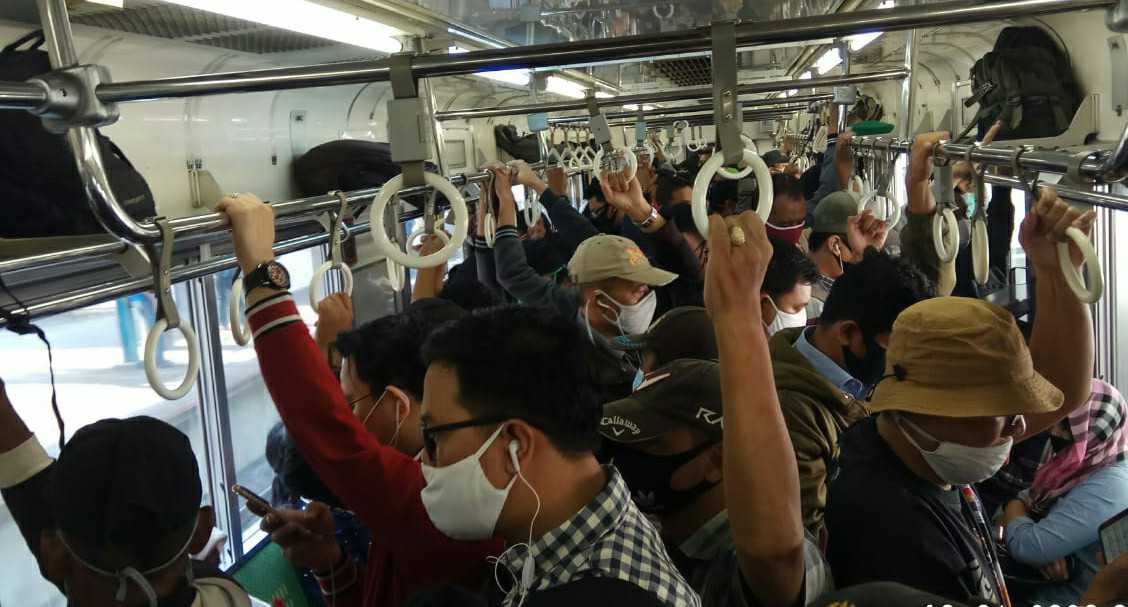‘New usual’ exposes poor railway infrastructure
17 June, 2020

Coach passengers in Greater Jakarta have already been fighting their daily commutes during the so-called “new normal”, for as long lines and crowded stations highlight the ongoing issues relating to having less public infrastructure and transportation facilities in the densely populated capital.
Commuter brand operator PT Kereta Commuter Indonesia (KCI) reported that passenger quantities surged to 279,000 on June 9 alone, from 80,000 per day on average through the large-scale public distancing (PSBB), due to the government commenced to reopen the market.
However, with well being protocols in destination to avoid COVID-19 transmitting, the business has limited passenger quantities to 40 percent of total capacity for each and every trip, resulting in packed stations over the region.
Seno Adi, 47, who lives on Bogor, West Java, and travels to Jakarta daily for do the job, lamented the prolonged line in the morning to plank a coach, while he also struggled with the packed automobiles that managed to get difficult to keep social distancing in order to avoid COVID-19 transmission.
Read also: Commuters go back to public transport with an increase of protective gear
“There were round 95-100 people in a single carriage and people stood so near to each other. It built the carriage therefore crowded and it had been tough to keep our distance,” he informed The Jakarta Content on June 11.
KCI maintains that although the company has increased the number of daily outings to 935 excursions from 784 trips per day ahead of the PSBB leisure, while as well increasing the amount of cars on each teach, the passenger crowding is “inevitable”.
“The long lines and crowding are very difficult in order to avoid if the pattern of commuter activities continues to be centered on the busy hours each morning and afternoon,” KCI vice president for corporate communication Anne Purba said in a statement on June 7.
She stated that the business had reached maximum optimization of its facilities, with a five-minute headway for the busy brand connecting Bogor and Jakarta, among other lines. The business runs 124 morning excursions and 126 afternoon excursions during the rush hours.
“On the Bogor line, it is so difficult to add more trips for the reason that headway is at the utmost capacity of the available railway infrastructure. Some railway tracks will be also distributed to other rail providers such as for example intercity trains and freight trains,” she added.
THE HIGHER Jakarta commuter series saw daily passenger volume jump to over 979,000 in 2019 from around 922,000 in 2018.
However, the rail infrastructure production needed to meet this increase continues to be lagging behind.
The projects are the double-double track (DDT) railway project connecting Manggarai, South Jakarta, and Cikarang, West Java, in addition to the separation between your Bogor line and the railway line to Bekasi, West Java, at Manggarai Station, with the latter set to be completed by year end.
“With the line separation [between the Bogor and Bekasi lines], the [commuter] train delays at Manggarai Station could be overcome,” Transportation Ministry Director General for Railways Zulfikri said on June 13.
Meanwhile, he said that the federal government was pursuing the completion of the DDT job by 2021.
The DDT railway expansion, initiated in 2002, is supposed to split up the tracks for long-haul trains, and the commuter brand, and also the airport railway, to reduce delays and increase rail capacity.
Meanwhile, another infrastructure job, the light rail transit (LRT), expected to connect cities found in Greater Jakarta, features been delayed until 2022, from its primary scheduled completion found in November 2021.
State construction organization Adhi Karya, the job programmer, cited the pandemic and territory clearance as the reason why behind the postponement.
With the existing gap between demand and the available infrastructure on the railways, professionals have called on the government to intervene to guard passengers' health.
“Trips should be more evenly pass on throughout the day. For instance, institutions and employers could implement versatile working hours so people don’t share the same working hours each morning,” Bandung Institute of Technology urban transportation researcher Puspita Dirgahayani explained on June 10.
Meanwhile, the Coordinating Maritime Affairs and Expense Ministry has stated that the government possesses intervened through the issuance of circular letter no. 8/2020 by the COVID-19 task power, which mandates the staggering of doing work time for civil servants, state-owned enterprises workers and private employees.
“This is what we can do as we can’t add more transportation facilities, it has reached maximum [capacity],” the ministry’s deputy of infrastructure and transportation coordination Ridwan Djamaluddin said on Monday.
Source: www.thejakartapost.com
